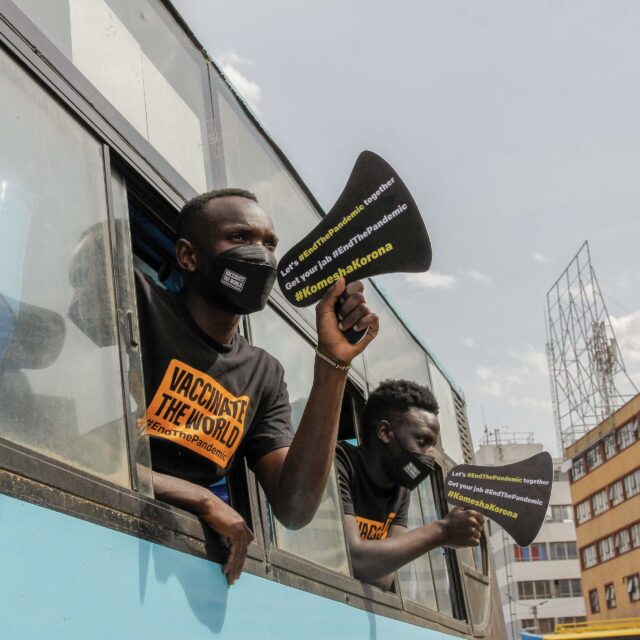This year Italy is at the head of the Group of 20 (G20), a crucial role in the global economic landscape. The presidency is a very important responsibility. It is even more so during a pandemic, in which new COVID-19 variants continue to develop, access to vaccines is not yet guaranteed to all, and poverty is growing exponentially after 20 years of progress in its eradication. All these factors make the adoption of comprehensive and inclusive economic measures even more needed.
“Our fiscal buffers are really exhausted,” said African Finance Ministersin March. There is a need for prompt, quick, and all-encompassing action: any multilateral meeting in which the necessary leadership and ambition is not demonstrated is a lost opportunity in rebuilding our societies for the better. “Build back better” should not be a slogan empty of meaning, but a coordinated and concrete response to the collective crisis of this moment, which is the result of the union of everyone’s efforts and will.
As Young Ambassadors of ONE, an organisation that fights for the eradication of extreme poverty and the end of preventable diseases by 2030, we ask fora truly inclusive economic, health, and social recovery, where no one is left behind. This is our call — will the G20 listen to us?
Paying off the debt or investing in post-pandemic reconstruction?
The International Monetary Fund (IMF) has declared that as long as the economic (and health) recovery is not global, the world financial system will continue to suffer from the negative effects of the pandemic. No government in this historical moment should be forced to choose whether to invest public resources in the response to the economic and health crisis or in the repayment of debt. Still, this is the dilemma that low-income states face if the G20 countries fail to act effectively.
In some countries, more has been invested in repaying debt than in any other type of expenditure, even healthcare (in Angola 37%, 26% in Ethiopia, and 20% in South Africa is spent in debt repayments). The temporary suspension of the payment of the debt service (DSSI) until June 2021, an initiative taken by Italy and the other G20 countries, was a very important step, but not long enough to guarantee these countries the necessary resources to keep the national economy afloat and cope with the health crisis. The DSSI is expected to be extended until the end of this year, or even 2022 — whatever needs to be done. Further measures are also needed: G20 governments must use their undeniable political weight to influence the World Bank, IMF, and private creditors to suspend multilateral and private debt service by aligning with the DSSI.
A new issue of Special Drawing Rights
In March, the IMF Executive Board officially supported a new allocation of Special Drawing Rights (SDRs) worth US$650 billion, of which 68% (equivalent to US$443 billion) would benefit G20 countries, representing the largest world economies, compared to 5% of African countries. Rich countries have twisted the rules of the game and spent over US$14 trillion to protect their economies, while countries most vulnerable to the economic shocks of the pandemic are left behind. Rich countries have other tools at their disposal to respond to the crisis and should not hesitate to use them. It is therefore vital that new SDRs are accompanied by a redistribution mechanism that transfers SDRs to low-income countries to help strengthen their response to COVID-19. Such an issue was used during the 2009 financial crisis — that experience should be treasured, and resources quickly channeled to the countries that need it the most.
Remittances: a critical source of income to protect
It is also essential to reduce the cost of sending remittances. If debt and SDRs are an economic lifeline for governments, remittances are the lifeline for families. Italy was among the first countries to promote this procedure as a tool for economic development and the reduction of inequalities and it is important that it remains a high priority interest on the G20 agenda. We recall that the Sustainable Development Goals (SDGs), signed by all G20 countries, call for a reduction in the cost of remittances to 3% — but currently the global average is 7%, with peaks in some countries of up to 15%. In addition, therefore, to the actual achievement of this goal, we suggest that these costs be eliminated during the pandemic.
A recovery for our future
As the generation most affected by the decisions made by this forum, we call for concrete action to increase the capacity of low-income countries to respond to the consequences of the pandemic crisis and we call on world leaders to act now. Italy holds a leadership position and must act for concrete, far-sighted, and ambitious multilateralism. The pandemic has shown us how interconnected we are and how much we depend on each other for our health and our economic security. It is therefore essential that the G20 take this opportunity to build our future inclusively and sustainably.
The scenario presented to us by international economic institutions is not a zero-sum game: the only way to win is by playing as a team globally, because leaving someone behind means everyone staying behind. Millions of young people around the world await your decisions in the discussions that will take place in the coming weeks and months, we ask our governmentand representatives to be far-sighted and come to the approval of a broad and inclusive package of economic measures for the global economic recovery. You have the power to guarantee us a better future, do not forget that.



